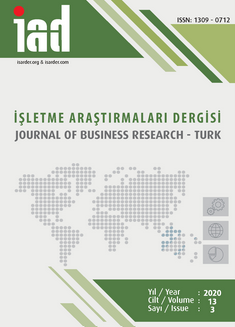Online Alışverişte Dürtüsel Kullanım, Kaçırma Korkusu, İçtepisel Satın Alma, İnternet Kaynaklı Yorgunluk ve Kaygı Arasındaki İlişkilerin İncelenmesi
Investigation of the Relationships Between Compulsive Use, Fear of Missing Out, Impulse Buying, Fatigue due to Internet and Anxiety in Online Shopping
Author(s): Hande Ayhan Gökcek, Ahmet Esad YURTSEVER, Engincan YILDIZSubject(s): Business Economy / Management, Behaviorism, Marketing / Advertising, ICT Information and Communications Technologies
Published by: Orhan Sağçolak
Keywords: Consumer Behavior; Psychology; Digital Marketing; Online Shopping; Structural Equation Modeling;
Summary/Abstract: Purpose – The aim of the research is to determine the effect of psychosocial welfare measures such as impulsive use of the internet, which is an indispensable element of life today, and the fear of missing out, on impulsive buying and its effect on fatigue and personal anxiety caused by internet use. Design/methodology/approach – The main mass of the research consists of consumers who live in any province of Turkey, are 18 years of age and older, and shop online. Survey technique was used to collect data and surveys were created via Google Forms. Snowball sampling method was used. 5 scales used in the survey; They are “Impulsive Use”, “Fear of Missing Out”, “Impulsive Buying”, “Internet-Induced Fatigue” and “Anxiety”. The research data were analyzed with IBM SPSS 24 and IBM AMOS 27 statistical package programs. Structural equation modeling was used to test the hypotheses. Previously, frequency analysis of demographic variables, compatibility of data to normal distribution, exploratory and confirmatory factor analysis, reliability analysis were performed. Findings – According to the results of the research, when the observation values of the variables were examined, the skewness and kurtosis values of the variables were found to be between -2 and +2, and it was seen that they met the normal distribution condition. After the exploratory factor analysis, the factor loading of a question of the “Fatigue due to Internet” variable was less than 0.50 and the total explained variance was low, this 1 question was removed and confirmatory factor analysis was performed. It was determined that the goodness of fit values of the confirmatory factor analysis were valid. As a result of the structural equation modeling, all four hypotheses were accepted and it was found that there was a significant and positive interaction between all tested relations. Impulsive use positively affects impulsive buying at a rate of 0.479, fear of missing out positively affects impulsive buying at a rate of 0.250, impulsive buying positively affects fatigue due to internet with a positive rate of 0.395 and impulsive buying anxiety positively with a rate of 0.323. Discussion – It has been observed that most of the data obtained as a result of the analysis support the relevant literature. However, some findings specific to this study, which had not been investigated before, were also reached. Various suggestions have been developed in line with the analysis results of the research.
Journal: İşletme Araştırmaları Dergisi
- Issue Year: 13/2021
- Issue No: 3
- Page Range: 1985-2002
- Page Count: 18
- Language: Turkish

